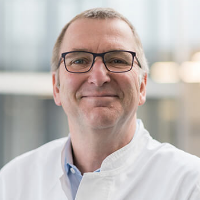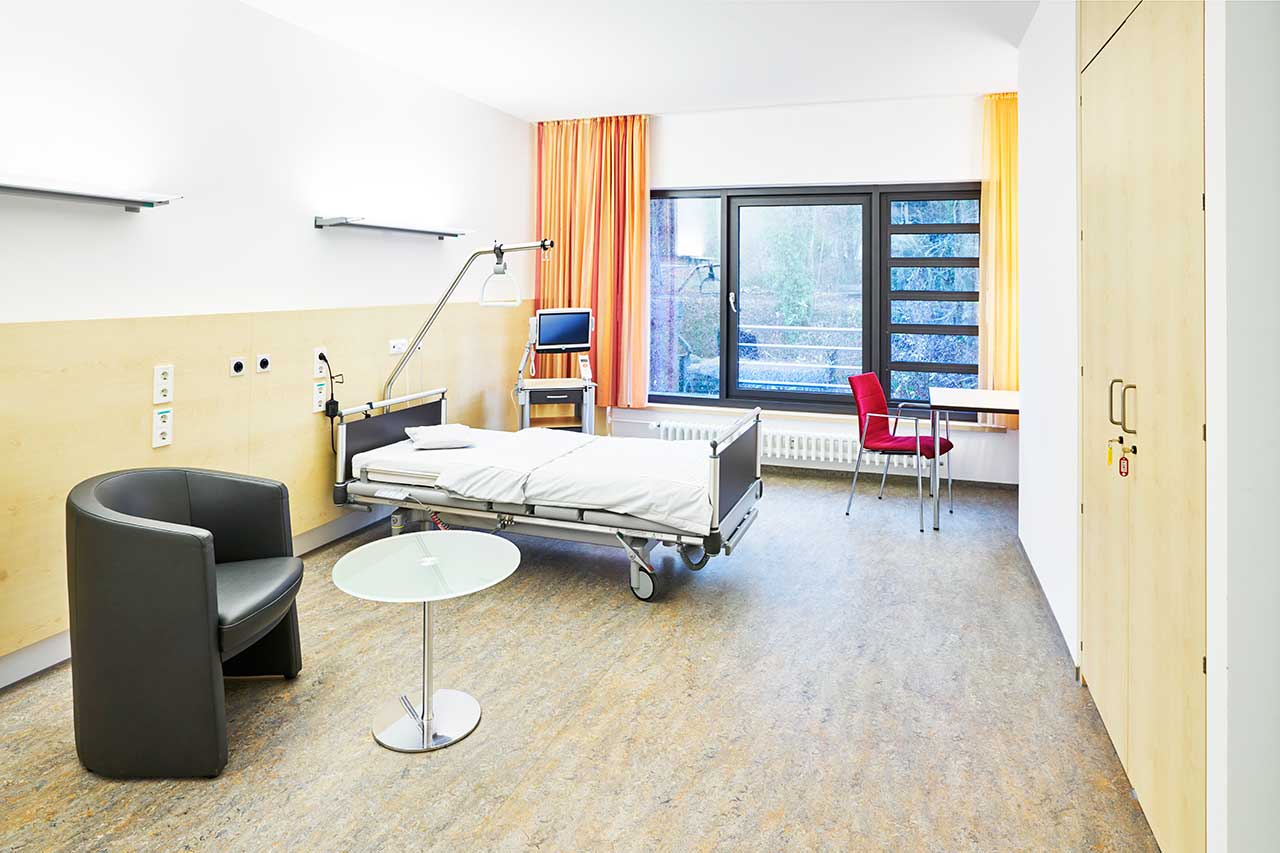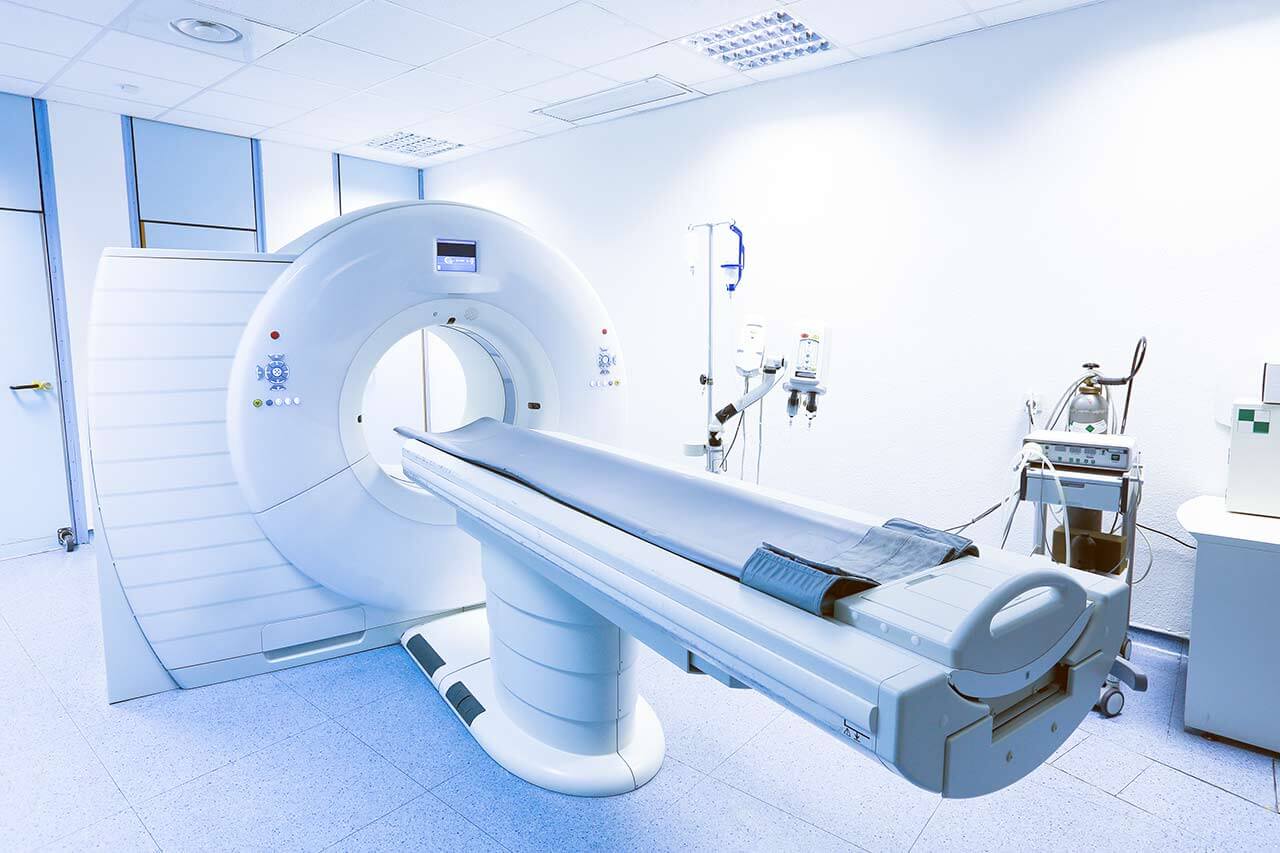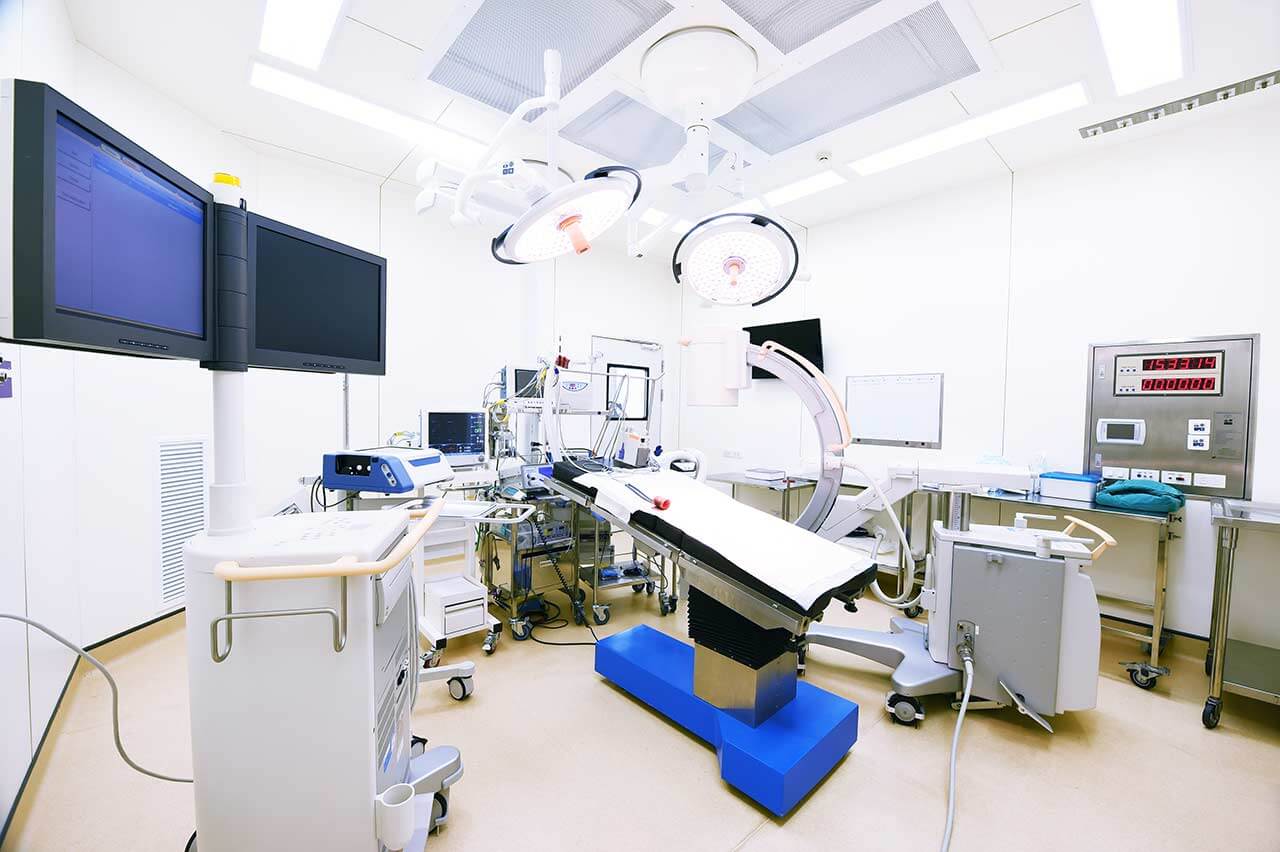
The program includes:
- Initial presentation in the clinic
- clinical history taking
- review of medical records
- physical examination
- laboratory tests:
- complete blood count
- biochemical analysis of blood
- inflammation indicators (CRP, ESR)
- TSH-basal, fT3, fT4
- indicators of blood coagulation
- CT-planning of radiation therapy
- full course of radiation therapy
- individual plan of the chemotherapy
(the cost of medicines is included) - symptomatic treatment
- cost of essential medicines and materials
- nursing services
- control examinations
- consultations of related specialists
How program is carried out
During the first visit, the doctor will conduct a clinical examination and go through the results of previous laboratory tests and instrumental examinations. After that, you will undergo an additional examination, including complete blood count, laboratory assessment of liver and kidney function. Based on the received results, the physician will elaborate the chemotherapy regimen, conduct radiotherapy planning with the help of CT or MRI, make the permanent tattoo marks on the skin and conduct CT simulation in order to assess the accuracy of the rays and the radiation dose. If necessary, related medical specialists will be involved in the elaboration of a treatment regimen (tumor board).
Chemotherapy and radiation therapy are carried out as the day hospital procedure, without mandatory admission to the hospital. At each visit, the physician will assess your general condition and the marks on the skin. After that, you will be placed in a shielded radiation therapy room, on a special table.
Each radiation therapy session lasts less than half an hour (including preparation). All this time, doctors and nurses are monitoring your condition, you can communicate with them through a loudspeaker. The procedure is completely painless. Depending on the planned course of treatment, you will visit the hospital from 1 to 3-5 times a week.
During the chemotherapy session, after the placement of a venous catheter, you will stay in a comfortable ward. An infusion system will be connected to the catheter, through which the required drug or a drug combination will be administered. All drugs are administered by intravenous drip, slowly, so the total duration of the infusion can be up to several hours. All this time, doctors and nurses will monitor your health condition closely.
After the completion of the chemotherapy and radiation therapy course, you will undergo control examinations aimed at assessing your condition and efficacy of treatment. After that you will receive the medical report with detailed recommendations regarding further follow-up and treatment. In the future, you will be able to have a distant consultation with your attending physician and schedule the next course of treatment, if necessary.
Required documents
- Medical records
- MRI/CT scan (not older than 3 months)
- Biopsy results (if available)
Service
You may also book:
 BookingHealth Price from:
BookingHealth Price from:
About the department
The Department of Hematology and Oncology at the University Hospital Erlangen provides diagnostics and comprehensive treatment of diseases of the hematopoietic system, as well as solid tumors of various organs. Hematologists most often deal with the treatment of acute and chronic leukemias, malignant lymphomas, myelodysplastic syndromes, plasmacytomas and other pathologies. Chemotherapy is usually first-line therapy. The department's specialists also successfully perform bone marrow transplantation. In the field of oncology, the department provides effective treatment of various tumors of the gastrointestinal tract, endocrine glands, female and male reproductive system, skin cancer, soft tissue and bone sarcomas, head and neck malignancies, etc. The patients suffering from cancer are offered classical (chemotherapy, immunotherapy, hormone therapy) and innovative (immunotherapy, CAR T-cell therapy) treatment methods. Surgical resection of solid tumors is performed by specialized surgeons. The treatment regimen is developed individually for each patient at the tumor board, which plays an important role in achieving a successful treatment result. The department is headed by Prof. Dr. med. Andreas Mackensen.
Along with inpatient beds, the department has a general outpatient clinic, a specialized outpatient clinic for the care of patients after allogeneic bone marrow transplantation, an outpatient clinic for chemotherapy and infusion therapy, as well as diagnostic laboratories. The department's medical team adheres to an individual approach to treatment, and therefore each clinical case is discussed with surgeons, radiation therapists and other experts in related fields in order to choose the optimal treatment tactics. Cancer patients often suffer from depressive states, so doctors devote enough time to personal communication, talking about the upcoming treatment and expected results, and also involve experienced psychologists in their work, who help to overcome emotional distress and set their mind on a favorable treatment result.
Hematology is one of the priority focuses of the department's doctors. The specialists of the medical facility often admit patients with severe malignant diseases of the hematopoietic system: acute and chronic leukemias, lymphomas, myelomas, myeloproliferative and myelodysplastic diseases, plasmacytomas. After conducting a diagnostic examination, making an accurate diagnosis, and determining the stage of cancer, doctors prescribe the most effective course of treatment, which is usually based on chemotherapy. With appropriate indications, hematologists perform autologous or allogeneic bone marrow stem cell transplantation. The department is certified by the German Cancer Society for the treatment of blood cancers, so patients can count on high quality therapy based on the standards of modern university medicine.
In the field of oncology, doctors provide conservative treatment of all types of malignant solid tumors, including breast cancer, cancer of the male and female reproductive system, thyroid cancer, skin cancer, rare neuroendocrine tumors, head and neck tumors, brain cancer, sarcomas, gastrointestinal cancer, lung cancer and others. The first stage of treatment is a comprehensive examination, with the help of which the department's oncologists make a particular diagnosis, determine the stage of the oncological process, the presence or absence of metastases, and assess a general condition of the patient. After receiving comprehensive clinical data, oncologists and doctors of related medical fields gather for tumor boards, during which they develop an individual treatment plan for the patient. The mainstay of therapy for solid malignancies is usually surgical resection of the neoplasm, which is complemented by chemotherapy, radiation therapy, immunotherapy, and other treatments. If a tumor is detected at its advanced stages, the patient receives palliative care aimed at eliminating pain, improving the quality of life and increasing its duration.
As a progressive medical facility, the department offers many innovative treatment methods, which are available only in leading hospitals in developed countries. One of such treatments is CAR T-cell therapy. This type of therapy has become a huge advance in the fight against blood cancer. CAR T-cell therapy involves injecting the patient's own T lymphocytes, which have undergone genetic modification and become capable of recognizing and purposefully destroying tumor cells. Depending on the patient's condition, therapy can take place both on an inpatient or outpatient basis. Prior to starting treatment, the patient's blood is taken. Blood is processed in laboratory conditions using high-tech equipment. The specialists isolate leukocytes, modify and multiply them, and then inject them to the patient. CAR T-cell therapy is most often used in the treatment of blood cancer when other methods are ineffective or the disease recurs.
The department specializes in the diagnostics and treatment of the following diseases:
- Hematology
- Acute and chronic leukemia
- Myeloproliferative diseases
- Myelodysplastic syndromes
- Malignant lymphomas
- Multiple myeloma
- Plasmacytoma
- Oncology
- Gastrointestinal cancer
- Cancer of the female reproductive system
- Breast cancer
- Cancer of the male reproductive system
- Endocrine cancer
- Lung cancer
- Ophthalmic cancer
- Skin cancer
- Head and neck malignancies
- Rare neuroendocrine tumors
- Bone and soft tissue sarcomas
- Malignant tumors of unknown primary
- Other diseases
The department's main therapeutic options include:
- Chemotherapy
- Antibody therapy
- Hormone therapy
- Immunotherapy
- Blood transfusion and infusion therapy
- CAR T-cell therapy
- Autologous and allogeneic bone marrow transplantation
- Other types of therapy
Curriculum vitae
Higher Education
- 1979 - 1981 Assistant in the laboratory, University Hospital Freiburg.
- 1981 - 1989 Study of Human Medicine, Albert Ludwig University of Freiburg.
- 16.05.1988 State Examination and Diploma in Medicine.
Postgraduate Training and Professional Career
- 26.05.1988 Admission to medical practice.
- 31.05.1988 Doctoral thesis defense (magna cum laude) at the Faculty of Medicine of Albert Ludwig University of Freiburg.
- 08.1988 - 06.1991 Research Fellow, Department of Hematology and Oncology, University Hospital Freiburg.
- 07.1991 - 06.1993 Scholarship of the German Research Foundation, Department of Oncoimmunology, Gustave Roussy Institute of Oncology, Villejuif, France.
- 07.1993 - 10.1998 Research Fellow, Department of Hematology and Oncology, University Hospital Freiburg.
- 10.04.1998 Habilitation in Internal Medicine, Albert Ludwig University of Freiburg.
- 23.10.1998 Venia legendi in Internal Medicine.
- 01.11.1998 Senior Physician, Department of Hematology and Oncology, University Hospital Freiburg.
- 02.12.1998 Board certification in Internal Medicine.
- 01.06.1999 C3 Professorship in Molecular Hematology, Department of Hematology and Oncology, University Hospital Regensburg.
- 06.1999 - 09.2007 Senior Physician, Department of Hematology and Oncology, University Hospital Regensburg.
- 01.06.2004 C3 Professorship (for life).
- 01.08.2007 Head (W3 Professor) of the Department of Hematology and Oncology, University of Erlangen-Nuremberg.
- Since 10.2007 Head of the Department of Hematology and Oncology at the University Hospital Erlangen.
Prizes, Awards and Honors
- 1990 Young Investigator Award of the International Endotoxin Society, San Diego.
- 1994 Vincenz Czerny Prize of the Austrian Society of Hematology and Oncology, Vienna.
Patents
- European patent, patent №95916557.2-2105.
Photo of the doctor: (c) Universitätsklinikum Erlangen
About hospital
According to the Focus magazine, University Hospital Erlangen ranks among the best medical facilities in Germany!
The hospital is one of the leading healthcare facilities in Bavaria and offers top-class medical care distinguished by the close intertwining of clinical activities with research and training of medical students. The hospital was founded in 1815 and today is proud of its rich traditions, numerous medical achievements and an excellent reputation not only in Germany, but also in the international arena. The hospital has 25 specialized departments, 7 institutes and 41 interdisciplinary centers, whose experts work tirelessly for the benefit of their patients.
The hospital has the status of a maximum care center, and therefore it represents almost all fields of modern medicine. Oncology, transplant medicine, and robot-assisted surgery are among the top priorities of the clinical activities of the medical complex. Oncology is represented by the Comprehensive Cancer Center Erlangen, which is one of 13 centers of excellence in Germany certified by the German Cancer Society. The university hospital has a high-tech center with high success rates for heart, liver, kidney, pancreas, cornea and bone marrow transplants. In addition, the hospital is a leader in the use of robot-assisted surgery. The medical facility has at its disposal innovative robotic technologies, in particular the da Vinci Surgical System, with the help of which surgeons perform many sparing interventions in various medical fields.
The medical team of the hospital consists of highly professional therapists, surgeons and nursing staff. The focus of their efforts is on the patient, his health and peace of mind, as well as comfort during treatment. The clinical practice of doctors is based on an individual approach to each case, which results in high treatment success rates. State-of-the-art technical equipment also plays an important role in the therapeutic process. The hospital is proud of the most advanced devices for imaging diagnostics (X-ray, ultrasound, CT, MRI, PET-CT, SPECT-CT, etc.), endoscopic examinations, laboratory tests, as well as specially equipped operating rooms for robot-assisted interventions, image-guided therapeutic manipulations, minimally invasive and classical surgeries of any complexity. Thus, the doctors of the university hospital have all the necessary resources to effectively treat the most severe pathologies and save lives.
The combination of high-tech equipment, experienced and highly qualified personnel, as well as strict adherence to the standards of modern medicine, form a solid foundation for the provision of the best medical care at the European level. An undeniable proof of the high prestige of the hospital is the constantly growing number of patients who come here from various regions of Germany and other countries of the world.
Photo: (с) depositphotos
Accommodation in hospital
Patients rooms
The patients of the University Hospital Erlangen live in comfortable rooms with light colors and modern design. Each patient room has an ensuite bathroom with shower and toilet. The furnishing of the patient room includes an automatically adjustable bed with an orthopedic mattress, a bedside table, a wardrobe, a table and chairs for receiving visitors, a TV, a radio and a telephone. Wi-Fi can be provided upon request. The use of a mobile phone is prohibited in many rooms of the hospital.
Patients can also live in enhanced-comfort rooms with a more sophisticated design. The enhanced-comfort rooms additionally include upholstered furniture, a minifridge and a safe.
Meals and Menus
The hospital offers healthy and tasty food distinguished by many awards, including the 1st place in the prestigious ESSEN PRO GESUNDHEIT competition of the Bavarian State Ministry of the Environment and Consumer Protection.
The patient and the accompanying person have three meals a day. Breakfast is served buffet style: scrambled eggs, boiled eggs, sausage, cheese, bread and buns with butter and jam, cereals, etc. There are three set menus for lunch and dinner to choose from: a classic menu featuring local cuisine dishes, a Mediterranean menu and a vegetarian menu.
If for some reason you do not eat all the foods, you will be offered an individual menu. Please inform the medical staff about your dietary preferences prior to the treatment.
The hospital also houses many cafeterias, which will delight with a wide range of delicious dishes and drinks.
Further details
Standard rooms include:
Religion
The hospital regularly hosts catholic and evangelical devine services. The services of representatives of other religions are available upon request.
Accompanying person
During an inpatient program, an accompanying person can stay with you in the patient room or in a hotel of your choice.
Hotel
During an outpatient program, you can stay in a hotel of your choice. The managers will help you choose the most suitable options.




